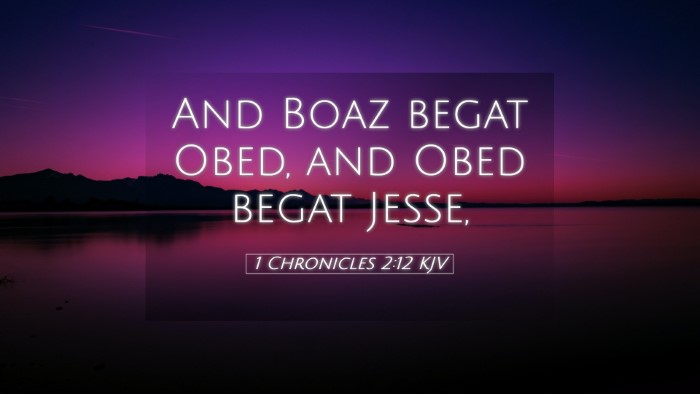Commentary on 1 Chronicles 2:12
Text of 1 Chronicles 2:12 (KJV): "And Boaz begat Obed, and Obed begat Jesse."
Introduction
This verse appears in a genealogical list that traces the lineage of significant biblical figures. The mention of Boaz, Obed, and Jesse is crucial for understanding God's plan as it unfolds through generations. The genealogies in the Chronicles highlight not only the physical lineage but also the spiritual heritage passed from one generation to the next.
Insights from Public Domain Commentaries
Matthew Henry's Commentary
Matthew Henry emphasizes the importance of this genealogy in the larger narrative of Scripture. He comments on the significance of Boaz as a kinsman-redeemer, underscoring God's providence in the lineage of David. Henry notes:
- God's Sovereign Plan: The inclusion of Boaz in the lineage shows that God’s plans often involve ordinary people, highlighting His ability to use anyone in fulfilling divine purposes.
- Redemption Theme: Boaz's role as a redeemer foreshadows the redemptive work of Christ, thereby establishing a theological link from the Old Testament to the New Testament.
- Legacy and Influence: The transition from Boaz to Jesse illustrates the importance of fatherhood and the responsibilities of passing on faith and integrity to the next generation.
Albert Barnes' Notes on the Bible
Barnes expands upon the names and their implications within Israel’s history. He provides a rich context for understanding Boaz, Obed, and Jesse by placing them within the framework of Israel's expectation for a messiah. Key insights include:
- Obed's Significance: Obed, as the son of Boaz and Ruth, signifies the inclusion of the Gentile (Ruth) into God's covenant people, showcasing the universal scope of God's salvation plan.
- Jesse and David: Jesse's importance comes from being the father of David, thus linking this genealogical record to the Davidic covenant, wherein God promised an everlasting kingdom through David's lineage.
- Spiritual Legacy: Barnes notes that the mention of these individuals signifies a line of faithfulness amidst various trials in Israel’s history, encouraging believers to remain steadfast.
Adam Clarke's Commentary
Adam Clarke delves into the historical context surrounding these names and their significance in the narrative of Scripture. He interprets the verse through a theological and historical lens:
- The Role of Women: Clarke highlights Ruth's role as a precursor to the Church, being a Moabite integrated into Israel's lineage, which signifies inclusivity and God's redemptive purpose transcending racial boundaries.
- Continuity of Generations: Emphasizing the continuity from Boaz to Obed to Jesse, Clarke notes that this lineage was vital in God's plan to bring forth the Messiah, administering hope to Israel during times of despair.
- Fulfillment of Promise: Clarke underscores that the genealogical record is not just a list of names but a testament to God keeping His covenant promises to Israel.
Theological Reflections
The verse encapsulates rich theological themes that pastors, theologians, and scholars can engage with:
- God's Providence: The genealogy illustrates God's providential order and design in human history. Each name tells a story of God's faithfulness and guidance.
- Faith and Legacy: The importance of leaving a godly legacy, as demonstrated by Boaz's righteous character and his lineage, serves as a challenge to contemporary believers regarding the values they pass on.
- The Messianic Lineage: Understanding the significance of this genealogy aids in recognizing the fulfillment of God’s promise through Jesus Christ, who comes from David’s line.
- Inclusivity in the Kingdom: The mention of Ruth in this lineage emphasizes God's open invitation to all humanity to be part of His family, challenging the church to be a welcoming community.
Practical Applications
This verse prompts several practical considerations for modern-day application:
- Encouragement in Despair: Believers can find comfort in knowing that God's plan for their lives may unfold in unexpected ways, as exemplified by Ruth's divine inclusion in the lineage of Christ.
- Value of Family: The significance of family and generational faithfulness points to the importance of nurturing faith within households, as parents have a unique opportunity to influence the next generation.
- Participation in God’s Story: Understanding one’s place within the overarching narrative of Scripture can encourage believers to actively participate in God’s ongoing redemptive work in the world.
Conclusion
In summary, 1 Chronicles 2:12 serves as a vital link in understanding the unfolding narrative of Scripture that eventually points to the Messiah. The insights drawn from the commentaries of Matthew Henry, Albert Barnes, and Adam Clarke together reveal the richness of God’s plan, the importance of legacy, and the hope embedded in this genealogy. For pastors, students, and scholars, engaging with this verse offers a microcosm of broader theological and practical themes prevalent throughout the Bible.


